It looks like you're using an Ad Blocker.
Please white-list or disable AboveTopSecret.com in your ad-blocking tool.
Thank you.
Some features of ATS will be disabled while you continue to use an ad-blocker.
6
share:
There are many great men who are largely forgotten from our nation’s rich political history. This is most unfortunate. Fortunately for you however,
here you will be introduced to these great men. Let this be a disclaimer, I do not particularly subscribe to any of their philosophies and seek to be
an objective reporter.
John Randolph of Roanoke
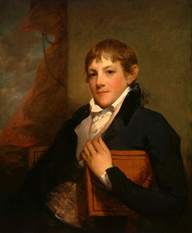
John Randolph was born in Cawsons, Virginia in 1773. At an unusually young age he was engaged in politics, joining the United States House of Representatives at 26. He was the cousin of President Thomas Jefferson, serving in the House as Jefferson served as President. However this familial closeness did not prevent him from breaking with his cousin politically. Joining as a fellow member of the Democratic – Republican Party, founded by Jefferson, he soon broke with him and created a reactionary faction known as the ‘Tertium quids’ who called for a return to the Principles of 1798.
Being an ardent defender of the anti-Federalist program, Southern gentry, and a hierarchical society stabilized by the landed elites, he developed a dislike of Jefferson’s policies as too nationalistic. He was quoted as saying "I am an aristocrat. I love liberty, I hate equality” and “We all know our duty better than we discharge it”. John has gone down as a particularly unique fixture in early American politics but still representative of Southern society as he was resoundingly re-elected many times.
One cannot truly document John Randolph without mentioning his particular style. Being a heavy drinker, occasional opium user, and generally eccentric, known for attending the House booted and spurred with a whip in hand, his dogs by his side and slaves nearby. However he later regretted ever owning a slave and upon his death set them free from their bondage.
Source
Henry Clay, Sr.
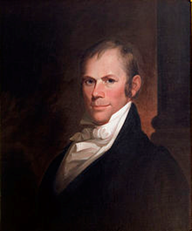
Henry Clay served as Speaker of the House from the state of Kentucky. Being a Democratic – Republican and later a Whig, he was a staunch defender of Thomas Jefferson’s program. More supportive of his ideas while President than before his Presidency, as John Randolph of Roanoke had been. During his early years in the US House he was an opponent of a National Bank and was known as a War Hawk, which was a politician supportive of confrontation with Great Britain in 1812.
By 1816 he had become a founding member of the American Colonization Society which began a program of transporting slaves to Liberia in Africa. During that same year Clay and John C. Calhoun created then helped pass the Tariff Act of 1816 which was part of a program called “The American Program”, based largely on Alexander Hamilton’s economic program. The intent was to prevent the flooding of cheap British goods into America which had been undermining our domestic manufacturing which was just developing.
Clay was a strong supporter of American intervention abroad; supporting independence movements in Latin America and the Greek revolutionaries of 1824. It was also Clay who developed the Missouri Compromise. And like many other Democratic – Republicans, when Andrew Jackson became President he disagreed vehemently with his policies leading Clay to join the newly created National Republican Party. With this split Clay became the leading opponent in the Senate of Andrew Jackson’s programs.
During the 1830s the National Republicans, who later became the Whigs, felt that Andrew Jackson was rapidly expanding the executive and trying to assume powers formerly allotted to the King. In reaction they used their new political power to halt his expansion of power by using the Congress. Clay had now come out in favor of the Second Bank which Jackson held strong disgust towards, promising not to renews its charter which resulted in Clay promising to censure Jackson. In 1832 Clay was nominated by the National Republican Party to challenge Jackson who was nominated by the newly formed Democratic Party, although he lost to Jackson 55% to 37%.
Source
Daniel Webster
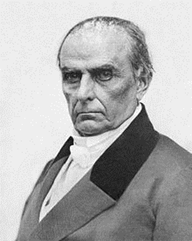
Daniel Webster was a Senator from Massachusetts and the most respected Conservative statesman of his era. He was first a Federalist then a National Republican and ended as a Whig. Perhaps the staunchest opponents of Jacksonian Democracy, Webster was known by many as a “thoroughgoing elitist” who “reveled in it”. He delivered what would be known as “the most eloquent speech ever delivered in the Congress” in his “Reply to Hayne”. In 1957 a Senate committee found Webster as one of the five greatest US Senators alongside Henry Clay, John C. Calhoun, Robert LaFollette, and Robert Taft.
In 1812 he attacked the war against Britain as a violation of New England’s trade rights by and the extremism among some New Englander’s who were calling for secession. He soon became known as the leading constitutional scholar of his age, serving on the Marshall Court; even argued 223 cases before the Supreme Court, winning half.
Webster joined the Senate in 1828 reversing his former position on tariffs, now supporting a protective tariff. Hayne had started a debate with Webster which led to two famous replies, the second one being the most noted:
This was a debate on the philosophy of nullification. Webster believed no state had the right to nullify as South Carolina was trying to do in 1832. The conflict arose over a tariff South Carolina refused to enforce causing Jackson to send his troops to the border and the Force Bill. On this Webster agreed with Jackson. However they vehemently disagreed on economics as Webster was a dedicated ally of the Second Bank.
Source
Horace Greeley
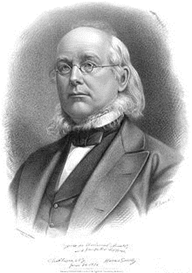
Horace Greeley was a newspaper editor, founder of the Liberal Republican Party, and co-founder of the Republican Party. As founder and editor of the New York Tribune which served as the most popular newspaper in America for 30 years, he held great influence over American politics. He was a supporter of the Whig Party before helping to found the Republican Party, as I documented before, and was an early supporter of reform movements such as Socialism.
Greeley was influenced early by Charles Fourier, a French philosopher who advocated utopian socialism, feminism, homosexual rights, and a ‘New World Order’. Greeley’s journal had Karl Marx and Friedrich Engels as correspondents in the 1850s. Abolitionism and Homestead laws were ideas he was a strong proponent of along with stronger enforcement of Reconstruction in the South, attacking Lincoln as being too moderate.
His personality was somewhat unusual as well, often quite eccentric. He wore long coats year round and always carried an umbrella with him. Greeley flirted with many ideas from utopian socialism to vegetarianism and while he was a radical republican who supported extreme enforcement of Reconstruction, he also was one of the 21 men to sign a $100,000 bond for former Confederate President Jefferson Davis’ release from prison. One notable statement he made was, “It is impossible to enslave mentally or socially a Bible-reading people. The principles of the Bible are the groundwork of human freedom.”
Source
Robert LaFollette, Sr.
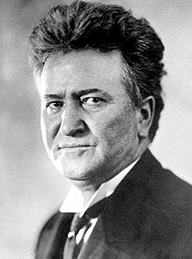
Robert LaFollette, Sr. was a passionate Progressive Senator from Wisconsin. He had been called “arguably the most important and recognized leader of the opposition to the growing dominance of corporations over the Government”. Being a staunch opponent of railroad trusts, entrance into World War I, and the League of Nations, he used strong and persuasive oratory to fight for progressive social and economic changes in America.
When serving as Governor of Wisconsin he championed the first workers’ compensation program, railroad rate reform, direct legislation, municipal home rule, minimum wage laws, non-partisan elections, open primaries, direct election of Senators, women’s suffrage, and progressive taxation. This same progressive attitude followed him into the Senate where he opposed entrance into World War I, fought for child labor laws, social security, women’s suffrage, and against the prosecution of Eugene V. Debs and other anti-war activists.
Perhaps the most controversial of his views was regarding World War I in which he insisted America had no right to get involved with. This resulted in him being considered the most hated man in America in 1917 and 1918. His position on the war led him to being called “a better German than the head of the German Parliament” by Mississippi Senator John Sharp Williams and “a skunk who ought to be hanged” by Theodore Roosevelt.
During a speech in St. Paul, Minnesota LaFollette declared America had “suffered grievance… at the hands of Germany” but not enough to risk millions of American lives. He then defended the right to free speech even as the Espionage Act was in effect. The crowd gave him a standing ovation but the Associated Press misquoted him, quoting LaFollette as saying “we had no grievance against Germany” and that the sinking of the American Lusitania was justified. This led to him and those at the meeting being labeled as traitors.
Source
John Randolph of Roanoke

John Randolph was born in Cawsons, Virginia in 1773. At an unusually young age he was engaged in politics, joining the United States House of Representatives at 26. He was the cousin of President Thomas Jefferson, serving in the House as Jefferson served as President. However this familial closeness did not prevent him from breaking with his cousin politically. Joining as a fellow member of the Democratic – Republican Party, founded by Jefferson, he soon broke with him and created a reactionary faction known as the ‘Tertium quids’ who called for a return to the Principles of 1798.
Being an ardent defender of the anti-Federalist program, Southern gentry, and a hierarchical society stabilized by the landed elites, he developed a dislike of Jefferson’s policies as too nationalistic. He was quoted as saying "I am an aristocrat. I love liberty, I hate equality” and “We all know our duty better than we discharge it”. John has gone down as a particularly unique fixture in early American politics but still representative of Southern society as he was resoundingly re-elected many times.
One cannot truly document John Randolph without mentioning his particular style. Being a heavy drinker, occasional opium user, and generally eccentric, known for attending the House booted and spurred with a whip in hand, his dogs by his side and slaves nearby. However he later regretted ever owning a slave and upon his death set them free from their bondage.
Source
Henry Clay, Sr.

Henry Clay served as Speaker of the House from the state of Kentucky. Being a Democratic – Republican and later a Whig, he was a staunch defender of Thomas Jefferson’s program. More supportive of his ideas while President than before his Presidency, as John Randolph of Roanoke had been. During his early years in the US House he was an opponent of a National Bank and was known as a War Hawk, which was a politician supportive of confrontation with Great Britain in 1812.
By 1816 he had become a founding member of the American Colonization Society which began a program of transporting slaves to Liberia in Africa. During that same year Clay and John C. Calhoun created then helped pass the Tariff Act of 1816 which was part of a program called “The American Program”, based largely on Alexander Hamilton’s economic program. The intent was to prevent the flooding of cheap British goods into America which had been undermining our domestic manufacturing which was just developing.
Clay was a strong supporter of American intervention abroad; supporting independence movements in Latin America and the Greek revolutionaries of 1824. It was also Clay who developed the Missouri Compromise. And like many other Democratic – Republicans, when Andrew Jackson became President he disagreed vehemently with his policies leading Clay to join the newly created National Republican Party. With this split Clay became the leading opponent in the Senate of Andrew Jackson’s programs.
During the 1830s the National Republicans, who later became the Whigs, felt that Andrew Jackson was rapidly expanding the executive and trying to assume powers formerly allotted to the King. In reaction they used their new political power to halt his expansion of power by using the Congress. Clay had now come out in favor of the Second Bank which Jackson held strong disgust towards, promising not to renews its charter which resulted in Clay promising to censure Jackson. In 1832 Clay was nominated by the National Republican Party to challenge Jackson who was nominated by the newly formed Democratic Party, although he lost to Jackson 55% to 37%.
Source
Daniel Webster

Daniel Webster was a Senator from Massachusetts and the most respected Conservative statesman of his era. He was first a Federalist then a National Republican and ended as a Whig. Perhaps the staunchest opponents of Jacksonian Democracy, Webster was known by many as a “thoroughgoing elitist” who “reveled in it”. He delivered what would be known as “the most eloquent speech ever delivered in the Congress” in his “Reply to Hayne”. In 1957 a Senate committee found Webster as one of the five greatest US Senators alongside Henry Clay, John C. Calhoun, Robert LaFollette, and Robert Taft.
In 1812 he attacked the war against Britain as a violation of New England’s trade rights by and the extremism among some New Englander’s who were calling for secession. He soon became known as the leading constitutional scholar of his age, serving on the Marshall Court; even argued 223 cases before the Supreme Court, winning half.
Webster joined the Senate in 1828 reversing his former position on tariffs, now supporting a protective tariff. Hayne had started a debate with Webster which led to two famous replies, the second one being the most noted:
When my eyes shall be turned to behold for the last time the sun in heaven, may I not see him shining on the broken and dishonored fragments of a once glorious Union; on States dissevered, discordant, belligerent; on a land rent with civil feuds, or drenched, it may be, in fraternal blood! Let their last feeble and lingering glance rather behold the gorgeous ensign of the republic... not a stripe erased or polluted, nor a single star obscured, bearing for its motto, no such miserable interrogatory as "What is all this worth?" nor those other words of delusion and folly, "Liberty first and Union afterwards"; but everywhere, spread all over in characters of living light, blazing on all its ample folds, as they float over the sea and over the land, and in every wind under the whole heavens, that other sentiment, dear to every true American heart,— Liberty and Union, now and for ever, one and inseparable!
This was a debate on the philosophy of nullification. Webster believed no state had the right to nullify as South Carolina was trying to do in 1832. The conflict arose over a tariff South Carolina refused to enforce causing Jackson to send his troops to the border and the Force Bill. On this Webster agreed with Jackson. However they vehemently disagreed on economics as Webster was a dedicated ally of the Second Bank.
Source
Horace Greeley

Horace Greeley was a newspaper editor, founder of the Liberal Republican Party, and co-founder of the Republican Party. As founder and editor of the New York Tribune which served as the most popular newspaper in America for 30 years, he held great influence over American politics. He was a supporter of the Whig Party before helping to found the Republican Party, as I documented before, and was an early supporter of reform movements such as Socialism.
Greeley was influenced early by Charles Fourier, a French philosopher who advocated utopian socialism, feminism, homosexual rights, and a ‘New World Order’. Greeley’s journal had Karl Marx and Friedrich Engels as correspondents in the 1850s. Abolitionism and Homestead laws were ideas he was a strong proponent of along with stronger enforcement of Reconstruction in the South, attacking Lincoln as being too moderate.
His personality was somewhat unusual as well, often quite eccentric. He wore long coats year round and always carried an umbrella with him. Greeley flirted with many ideas from utopian socialism to vegetarianism and while he was a radical republican who supported extreme enforcement of Reconstruction, he also was one of the 21 men to sign a $100,000 bond for former Confederate President Jefferson Davis’ release from prison. One notable statement he made was, “It is impossible to enslave mentally or socially a Bible-reading people. The principles of the Bible are the groundwork of human freedom.”
Source
Robert LaFollette, Sr.

Robert LaFollette, Sr. was a passionate Progressive Senator from Wisconsin. He had been called “arguably the most important and recognized leader of the opposition to the growing dominance of corporations over the Government”. Being a staunch opponent of railroad trusts, entrance into World War I, and the League of Nations, he used strong and persuasive oratory to fight for progressive social and economic changes in America.
When serving as Governor of Wisconsin he championed the first workers’ compensation program, railroad rate reform, direct legislation, municipal home rule, minimum wage laws, non-partisan elections, open primaries, direct election of Senators, women’s suffrage, and progressive taxation. This same progressive attitude followed him into the Senate where he opposed entrance into World War I, fought for child labor laws, social security, women’s suffrage, and against the prosecution of Eugene V. Debs and other anti-war activists.
Perhaps the most controversial of his views was regarding World War I in which he insisted America had no right to get involved with. This resulted in him being considered the most hated man in America in 1917 and 1918. His position on the war led him to being called “a better German than the head of the German Parliament” by Mississippi Senator John Sharp Williams and “a skunk who ought to be hanged” by Theodore Roosevelt.
During a speech in St. Paul, Minnesota LaFollette declared America had “suffered grievance… at the hands of Germany” but not enough to risk millions of American lives. He then defended the right to free speech even as the Espionage Act was in effect. The crowd gave him a standing ovation but the Associated Press misquoted him, quoting LaFollette as saying “we had no grievance against Germany” and that the sinking of the American Lusitania was justified. This led to him and those at the meeting being labeled as traitors.
Source
edit on 2/21/2012 by Misoir because: (no reason given)
reply to post by Misoir
Dear Misoir,
I don't know why I didn't see this earlier. In a sane world this would get 200 flags and 150 stars.
These were men of ideas. Men with ideas for the country as a whole, who saw the country as a whole. Not pusilanimous pussy-footers who can only think of themselves and their friends. Those self-serving midgets who have no principle but their own success.
These giants of America are brushed over in our history, if touched on at all. How can we progress if we don't know where we have been and why?
This thread, and the discussion of the ideas these men espoused should go on for days.
I'm upset. You do magnificent work. I'm jealous of your gifts.
With respect,
Charles1952
Dear Misoir,
I don't know why I didn't see this earlier. In a sane world this would get 200 flags and 150 stars.
These were men of ideas. Men with ideas for the country as a whole, who saw the country as a whole. Not pusilanimous pussy-footers who can only think of themselves and their friends. Those self-serving midgets who have no principle but their own success.
These giants of America are brushed over in our history, if touched on at all. How can we progress if we don't know where we have been and why?
This thread, and the discussion of the ideas these men espoused should go on for days.
I'm upset. You do magnificent work. I'm jealous of your gifts.
With respect,
Charles1952
It should be noted that many historians consider Daniel Webster a mentor of Abraham Lincoln.
Good post!
Good post!
reply to post by Misoir
Misoir, S&F for a great thread. I am embarrassed to admit that I was only familiar with half of the gentlemen that you profiled, but delighted that I was able to learn more through your thread contribution.
Sometimes the world seems so hell bent on racing forward into the future blindly, we fail to recognize the rich lessons our history can teach us. The infamous quote frames this much better than I can:
"Those who cannot remember the past, are condemned to repeat it," George Santayana
Misoir, S&F for a great thread. I am embarrassed to admit that I was only familiar with half of the gentlemen that you profiled, but delighted that I was able to learn more through your thread contribution.
Sometimes the world seems so hell bent on racing forward into the future blindly, we fail to recognize the rich lessons our history can teach us. The infamous quote frames this much better than I can:
"Those who cannot remember the past, are condemned to repeat it," George Santayana
reply to post by charles1952
Thank you, Charles, for your kind words as always.
reply to post by jrod
Daniel Webster was regarded as the intellectual force of the American political Conservative tradition, one dating back to the Federalist Party. Although there were a few Conservatives within the Democratic – Republican Party, it was largely Liberal (Classical); John Randolph of Roanoke is a good example of Conservative D – R. So it is easy to understand how Webster had such an impact on Abraham Lincoln’s political and philosophical thought, being a Whig politician and sympathizer.
Daniel Webster, Henry Clay, and Abraham Lincoln together shaped the American Conservative philosophy from the mid-19th century until its fall in the early 1930s. Men such as Calvin Coolidge, William McKinley, Henry Cabot Lodge, Robert LaFollette, and so on were heavily influenced by their ideas. The Republican Party was largely under the sway of the intellectual descendants of Webster, Clay, and Lincoln from the end of Reconstruction until the Great Depression.
Thank you, Charles, for your kind words as always.
reply to post by jrod
Daniel Webster was regarded as the intellectual force of the American political Conservative tradition, one dating back to the Federalist Party. Although there were a few Conservatives within the Democratic – Republican Party, it was largely Liberal (Classical); John Randolph of Roanoke is a good example of Conservative D – R. So it is easy to understand how Webster had such an impact on Abraham Lincoln’s political and philosophical thought, being a Whig politician and sympathizer.
Daniel Webster, Henry Clay, and Abraham Lincoln together shaped the American Conservative philosophy from the mid-19th century until its fall in the early 1930s. Men such as Calvin Coolidge, William McKinley, Henry Cabot Lodge, Robert LaFollette, and so on were heavily influenced by their ideas. The Republican Party was largely under the sway of the intellectual descendants of Webster, Clay, and Lincoln from the end of Reconstruction until the Great Depression.
new topics
-
Sunak spinning the sickness figures
Other Current Events: 6 minutes ago -
Nearly 70% Of Americans Want Talks To End War In Ukraine
Political Issues: 17 minutes ago -
Late Night with the Devil - a really good unusual modern horror film.
Movies: 2 hours ago -
Cats Used as Live Bait to Train Ferocious Pitbulls in Illegal NYC Dogfighting
Social Issues and Civil Unrest: 3 hours ago -
The Good News According to Jesus - Episode 1
Religion, Faith, And Theology: 5 hours ago -
HORRIBLE !! Russian Soldier Drinking Own Urine To Survive In Battle
World War Three: 7 hours ago -
Bobiverse
Fantasy & Science Fiction: 10 hours ago -
Florida man's trip overseas ends in shock over $143,000 T-Mobile phone bill
Social Issues and Civil Unrest: 10 hours ago
top topics
-
Florida man's trip overseas ends in shock over $143,000 T-Mobile phone bill
Social Issues and Civil Unrest: 10 hours ago, 8 flags -
SETI chief says US has no evidence for alien technology. 'And we never have'
Aliens and UFOs: 14 hours ago, 7 flags -
Cats Used as Live Bait to Train Ferocious Pitbulls in Illegal NYC Dogfighting
Social Issues and Civil Unrest: 3 hours ago, 7 flags -
This is our Story
General Entertainment: 16 hours ago, 4 flags -
Former Labour minister Frank Field dies aged 81
People: 12 hours ago, 4 flags -
Bobiverse
Fantasy & Science Fiction: 10 hours ago, 3 flags -
Late Night with the Devil - a really good unusual modern horror film.
Movies: 2 hours ago, 2 flags -
HORRIBLE !! Russian Soldier Drinking Own Urine To Survive In Battle
World War Three: 7 hours ago, 2 flags -
The Good News According to Jesus - Episode 1
Religion, Faith, And Theology: 5 hours ago, 0 flags -
Nearly 70% Of Americans Want Talks To End War In Ukraine
Political Issues: 17 minutes ago, 0 flags
6
